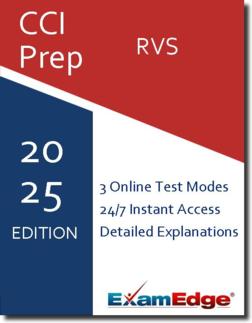CCI RVS (RVS) Practice Tests & Test Prep by Exam Edge - FAQ
Based on 22 Reviews
- Real Exam Simulation: Timed questions and matching content build comfort for your CCI RVS test day.
- Instant, 24/7 Access: Web-based CCI Registered Vascular Specialist practice exams with no software needed.
- Clear Explanations: Step-by-step answers and explanations for your CCI exam to strengthen understanding.
- Boosted Confidence: Reduces anxiety and improves test-taking skills to ace your CCI Registered Vascular Specialist (RVS).

Why should I use Exam Edge to prepare for the CCI Registered Vascular Specialist Exam?
FAQ's for Exam Edge CCI Registered Vascular Specialist practice tests
- Comprehensive content: Exam Edge's CCI Registered Vascular Specialist practice tests are created specifically to prepare you for the real exam. All our CCI RVS practice test questions parallel the topics covered on the real test. The topics themselves are covered in the same proportions as the real test too, based on outlines provided by the Cardiovascular Credentialing International in their CCI RVS test guidelines.
- Realistic practice: Our CCI RVS practice exams are designed to help familiarize you with the real test. With the same time limits as the real exam, Our CCI (cardio) practice tests enable you to practice your pacing and time management ahead of test day.
- Detailed explanations: As you complete your practice tests, we show you which questions you answered correctly and which ones you answered incorrectly, in addition to providing you with detailed step-by-step explanations for every single CCI Registered Vascular Specialist practice exam question.
- Performance insights: After you complete a practice test, we provide you with your raw score (how many you answered correctly) and our estimate of the CCI RVS score you would have received if you had taken the real test.
- Ease of access: Because all Our CCI (cardio) practice tests are web-based, there is no software to install. You can take CCI RVS practice exams on any device with access to the internet, at any time.
- Flexible use: If you must pause while taking one of Our CCI (cardio) practice exam, you can continue right where you left off. When you continue the test, you will start exactly where you were, and with the same amount of time you had remaining.
- Thousands of unique questions: We offer 5 different online practice exams with 500 unique questions to help you prepare for your CCI Registered Vascular Specialist !
- Low cost: The cost of ordering 5 practice tests is less than the cost of taking the real CCI RVS test. In other words, it would be less expensive to order 5 practice tests than to retake the real CCI Registered Vascular Specialist exam!
- Our trusted reputation: As a fully accredited member of the Better Business Bureau, we uphold the highest level of business standards. You can rest assured that we maintain all of the BBB Standards for Trust.
- Additional support: If you need additional help, we offer specialized tutoring. Our tutors are trained to help prepare you for success on the CCI Registered Vascular Specialist exam.
What score do I need to pass the CCI RVS Exam?
To pass the CCI Registered Vascular Specialist test you need a score of 650.
The range of possible scores is 500 to 900.
How do I know the practice tests are reflective of the actual CCI Registered Vascular Specialist ?
At Exam Edge, we are proud to invest time and effort to make sure that Our CCI (cardio) practice tests are as realistic as possible. Our practice tests help you prepare by replicating key qualities of the real test, including:
- The topics covered
- The level of difficulty
- The maximum time-limit
- The look and feel of navigating the exam
Do you offer practice tests for other Cardiovascular Credentialing International subjects?
Yes! We offer practice tests for 8 different exam subjects, and there are 75 unique exams utilizing 7500 practice exam questions. Every subject has a free sample practice test you can try too!
CCI Certified Cardiographic Technician
(CCT
™
)
Practice Tests
CCI Certified Rhythm Analysis
(CRAT
™
)
Practice Tests
CCI RCES
(RCES
™
)
Practice Tests
CCI Registered Cardiac Sonographer
(RCS
™
)
Practice Tests
CCI RCIS
(RCIS
™
)
Practice Tests
CCI Registered Congenital Cardiac Sonographer
(RCCS
™
)
Practice Tests
CCI Registered Phlebology Sonographer
(RPhS
™
)
Practice Tests
CCI Registered Vascular Specialist
(RVS
™
)
Practice Tests
To order tests, or take a sample test, for a different subject:
Click on ' Name on the Exam Name' You will be take to the orders page
How do I register for the real Cardiovascular Credentialing International?
For up-to-date information about registration for the Cardiovascular Credentialing International, refer to the Cardiovascular Credentialing International website.
What are the CCI (cardio) exams?
What are the CCI (cardio) exams all about?
Established in 1968, Cardiovascular Credentialing International (CCI) is an independent not-for-profit corporation that administers cardiovascular credentialing exams. CCI offers credentials in nine specialized cardiac fields.
The CCI certification examinations assess knowledge and skills to current practice. These computer-based tests are administered at Pearson Professional Centers. Most exams are 3 hours in length and have 170 multiple-choice questions of which only 150 count toward a candidate’s score. Ten minutes of the test time is allotted for a tutorial and post-exam survey. The CCT and CRAT exams are each 2 hours in length and have 130 questions (110 scored and 20 unscored). Ten minutes for a tutorial and post-exam survey are included in the total test time. Specific information about the content for each exam can be found at the CCI website at cci-online.org.
Unofficial score reports are provided at the end of each exam. Official results are mailed about 15 days after taking the exam. Scores are scaled from 0 – 900 with 650 being the minimum score required to pass an exam.
For more information on CCI exams visit Cardiovascular Credentialing International (CCI).


